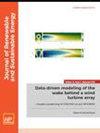提高短期风力发电预测的准确性,以便可靠、安全地将其纳入电力系统:灰色关系分析和优化支持向量回归机方法
IF 1.9
4区 工程技术
Q4 ENERGY & FUELS
引用次数: 0
摘要
电力系统的可靠性和安全性在很大程度上取决于对新能源发电的准确预测。然而,新能源发电功率的非平稳性和随机性增加了预测难度。本文旨在提出一种具有较强表征能力的短期风电预测方法,以准确了解未来新能源发电情况,确保电力系统的可靠性和安全性。通过灰色关系分析方法确定风功率预测所需的输入变量。通过改进海洋捕食者算法,提高收敛能力和摆脱局部最优解的概率,提出了一种先进的海洋捕食者算法。高级海洋捕食者算法对支持向量回归机进行了优化,解决了传统方法中根据个人经验选择参数值导致其预测性能利用率不足的问题。最后,不同的风力发电场景验证了该算法的有效性和通用性。这项研究促进了人工智能技术在提高短期风电预测精度方面的应用,从而提高了电力系统的可靠性和安全水平。本文章由计算机程序翻译,如有差异,请以英文原文为准。
Enhancing short-term wind power forecasting accuracy for reliable and safe integration into power systems: A gray relational analysis and optimized support vector regression machine approach
The reliability and safety of power systems heavily depend on accurate forecasting of new energy generation. However, the non-stationarity and randomness of new energy generation power increase forecasting difficulty. This paper aims to propose a short-term wind power forecasting method with strong characterization ability to accurately understand future new energy generation conditions so as to ensure power systems' reliability and safety. The required input variables for wind power forecasting are determined by the gray relational analysis method. An advanced marine predators algorithm is proposed by improving the marine predators algorithm to enhance convergence ability and probability of escaping local optimal solutions. The advanced marine predators algorithm optimizes support vector regression machine to address the issue of insufficient utilization of its forecasting performance due to the selection of parameter values based on personal experience in traditional methods. Finally, different wind power generation scenarios verify its effectiveness and universality. This study promotes the application of artificial intelligence technology for improving short-term wind power forecasting accuracy, thereby enhancing the reliability and safety level of power systems.
求助全文
通过发布文献求助,成功后即可免费获取论文全文。
去求助
来源期刊

Journal of Renewable and Sustainable Energy
ENERGY & FUELS-ENERGY & FUELS
CiteScore
4.30
自引率
12.00%
发文量
122
审稿时长
4.2 months
期刊介绍:
The Journal of Renewable and Sustainable Energy (JRSE) is an interdisciplinary, peer-reviewed journal covering all areas of renewable and sustainable energy relevant to the physical science and engineering communities. The interdisciplinary approach of the publication ensures that the editors draw from researchers worldwide in a diverse range of fields.
Topics covered include:
Renewable energy economics and policy
Renewable energy resource assessment
Solar energy: photovoltaics, solar thermal energy, solar energy for fuels
Wind energy: wind farms, rotors and blades, on- and offshore wind conditions, aerodynamics, fluid dynamics
Bioenergy: biofuels, biomass conversion, artificial photosynthesis
Distributed energy generation: rooftop PV, distributed fuel cells, distributed wind, micro-hydrogen power generation
Power distribution & systems modeling: power electronics and controls, smart grid
Energy efficient buildings: smart windows, PV, wind, power management
Energy conversion: flexoelectric, piezoelectric, thermoelectric, other technologies
Energy storage: batteries, supercapacitors, hydrogen storage, other fuels
Fuel cells: proton exchange membrane cells, solid oxide cells, hybrid fuel cells, other
Marine and hydroelectric energy: dams, tides, waves, other
Transportation: alternative vehicle technologies, plug-in technologies, other
Geothermal energy
 求助内容:
求助内容: 应助结果提醒方式:
应助结果提醒方式:


